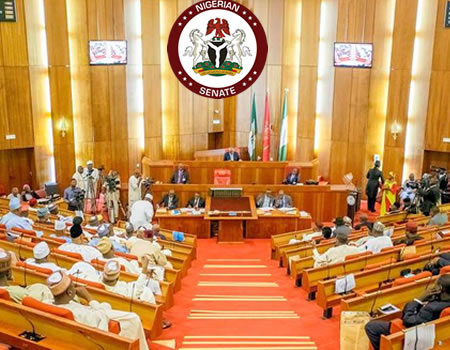Senate dampens hope on restructuring as it rejects devolution of powers, Land Use Act in Constitution amendment votes

…Full list of constitution amendments by senate
The Senate, on Wednesday, amended 29 out of 33 sections of the constitution listed for amendment in the Fourth Constitution alteration bill.
The lawmakers, who had on Tuesday debated the general principles of the bills, slated the clause by clause voting for Wednesday.
During the voting process, key aspects of the amendment, including the push for devolution of powers (bill number three), amendment of the Land Use Act (contained in Bill number 32), the bid for 35 per cent affirmative action for women (contained in bill number 11 and 23) were rejected as they failed to muster 73 votes needed for a clause to scale through.
The senators had been sharply divided along geopolitical lines on Tuesday, following push by northern senators to reject the proposed amendment to the Land Use Act.
It was gathered on Wednesday that the northern caucus in the Senate moved against the passage of the amendment on Tuesday night when they orchestrated information that passing the Land Use Act amendment would give rise to resource control through the back door.
Some of the lawmakers said the northern senators were able to frustrate the Land Use amendment clause by instilling the fear of resource control in others.
“What happened was that senators from the North, who had made up their mind to frustrate the amendment bill, sent words round that passing the amendment amounts to approving resource control. That scared senators from the Middle-Belt who had earlier promised to vote alongside their southern colleagues,” a senator had said.
In rejecting the devolution of powers bill, 46 senators voted in support while 49 voted against it, while one lawmaker abstained.
The bill sought to alter the Second Schedule, Part I & II of the Constitution to devolve certain powers from the exclusive legislative list to the concurrent legislative list.
The bill also proposed to give more legislative powers to states, while also delineating the extent to which the federal legislature and state houses of assembly could legislate on the items in the concurrent legislative list.
Apart from rejecting the devolution of powers, the senators also rejected the bid to amend the Land Use Act section of the constitution.
The bill, listed as item 32 in the alteration bills, had sought to alter the 1999 Constitution to delete the Land Use Act from the constitution such that it could be subject to the regular process of amendment.
The Senate, however, rejected the item number seven on the alteration bill which would have guaranteed state creation and boundary adjustment.
The bill sought to alter section eight of the constitution to ensure that only democratically-elected local government councils would participate in the process of state creation and boundary adjustment.
It also sought to remove ambiguities in the extant provisions to enhance clarity with respect to the procedure for state creation.
Again, the senators rejected the affirmative action for women by voting against bill number 11 of the alteration bills, which sought to guarantee 35 per cent of ministerial appointments for women.
The bill essentially sought to provide timeframe for submitting names of ministerial or commissioners nominees to the National Assembly or state assembly.
The bill, according to the document, “seeks to alter the Constitution of the Federal Republic of Nigeria, 1999 to set
a timeframe within which the president or a governor shall forward to the Senate or State House of Assembly, names of nominees for confirmation as ministers or commissioners; provide for attachment of portfolio and 35 per cent affirmative action for women.”
To defeat this clause, 49 senators voted yes, while 43 voted against, while two senators abstained.
To defeat the quest for 35 per cent affirmative action for women as commissioners in the states, the Senate voted 61 for and 35 against. None abstained.
The senators again hit the women hard when they rejected the bill seeking to allow a married woman the right to choose either her state of birth or state of marriage for purposes of appointments.
Senators voted 49 (yes) and 46 (no) to defeat the clause.
The women indigeneship bill sought to alter section 25 of the Constitution to guarantee a married woman’s right to choosing either her indigeneship by birth or by marriage for the purposes of appointment or election.
However, the Senate passed the clause seeking amendment to the composition of Council of States by including Senate presidents as members. 93 Senators voted to support the inclusion of the Senate presidents and speakers of the House of Representatives, while one abstained.
The senators also approved the deletion of State Independent Electoral Commissions (SIECs), with 73 voting in favour, while 19 voted against. Two abstained.
Another key amendment passed by the Senate was the granting of financial autonomy for state legislature by providing for the funding of the state houses of Assembly directly from the Consolidated Revenue Fund of the state.
Besides, the lawmakers also voted for the amendment of Section 162 of the 1999 Constitution to abrogate the state joint local government accounts and empower each local government to maintain its own special account into which all allocations due to the council shall be directly paid from the Federation Account.
The states are also expected to pay funds accruable to the councils from the states’ IGR into the same account.
Bill number six of the amendment also scaled the huddle in the Senate with 88 senators voting in favour of the bid to strengthen the local governments by ensuring the democratic existence, funding and tenure of local government councils. Only eight lawmakers opposed the bill.
In voting for the approval of the eight bill on its list, the senators voted 93 in favour and one against. The bill seeks to alter sections 4, 51, 67, 68, 93 and 109 of the constitution to provide immunity for members of the legislature, in respect of words spoken or written at plenary sessions or at committee proceedings.
The bill also sought to institutionalise legislative bureaucracy in the constitution like the Civil Service Commission in the executive and the Judicial Service Commission in the judiciary; and obligate the president to attend a joint meeting of the National Assembly once a year to deliver a State of the Nation address.
Again, the Senate provided time frame for the Independent National Electoral Commission (INEC) to conduct by-elections and de-register political parties for non-fulfillment of certain conditions.
The lawmakers also passed bill number 10 to reduce the time frame to assent to bills by the president and governors with 95 voting yes and one no.
Essentially, the bill sought to alter sections 58, 59 and 100 to resolve the impasse where the president or governor neglected to signify his/her assent to a bill from the National Assembly or withhold such assent.
To fast-track the process of composition of government after transition, the Senate approved amendments to set a timeframe within which the president or a governor must forward the list of ministerial or commissioner nominees to the Senate or the House of Assembly.
The lawmakers, however, rejected a component of the bill seeking 35 per cent affirmative action for women in the nominations.
The lawmakers also passed the approval for appointment of minister from the Federal Capital Territory (FCT), by seeking to alter section 147 of the Constitution. Seventy-seven senators voted in favour of the bill.
Another key amendment passed by the Senate was the independent candidature for elections, which ensured the amendment of sections 65, 106, 131 and 177 of the constitution.
This was aimed at expanding the political space and broadening the options for the electorate by allowing for independent candidacy in all elections.
The Senate also passed amendment to sections 34, 35, 39, 214, 215, 216 and the Third Schedule to allow for the change in the name of the Police from “Nigeria Police Force” to “Nigeria Police,” in order to reflect their core mandate.
Passing the alteration bill number 16, the lawmakers approved the bill by voting 88 (yes), while one abstained.
The bill sought to restrict a person who was sworn in as president or governor to complete the term of the elected president from contesting for the same office for more than one term.
Also, 89 senators voted in favour of the proposal to split the office of the Accountant-General of the Federation by altering section 84 of the constitution to establish the office of the Accountant-General of the Federal Government separate from office of the Accountant-General of the Federation.
In the same vein, 95 senators voted to grant financial independence to the Office of the Auditor-General of the Federation. The bill sought to make the office of the Auditor-General for the Federation and for the state financially independent by placing them on first-line charges in the Consolidated Revenue Funds of the Federation and of the states.
The lawmakers also separated the office of the Attorney-General of the Federation and of the state from the office of the minister or commissioner for Justice.
The bill sought to create an independent office of the Attorney-General of the Federation insulated from partisanship and politics, while defining the role of the Attorney-General with a fixed tenure.
Other key amendments that scaled the huddle in the Senate include the “not too young to run” bill, which sought to reduce the age qualification for office of the president, senator, member of the House of Representatives and the state assembly.
The Bill sought to alter the sections 65, 106, 131, 177 of the constitution to reduce the age qualification for the offices of the president, governor and membership of the Senate, House of Representatives and the state houses of Assembly.
The Senate also amended the bill seeking to provide a time frame for the president or governor to lay the Appropriation Bill before the National Assembly or House of Assembly to encourage the early presentation and passage of Appropriation Bills.
Currently, the president and governors have a six-month window, which the Senate had reduced to three.
The lawmakers successfully deleted the NYSC Decree, the Public Complaints Commission Act and the National Securities Act from the constitution through the amendments that scaled on Wednesday.
Speaking at the end of the voting exercuise, Senate President, Dr Bukola Saraki, said he was thankful for his colleagues who took pains to go through the exercise.
“This is an exercise for which we gave a promise and we have kept to it. Definitely, we have made history this afternoon with the exercise that we have carried out, not only in the timing or the content of the exercise that we have carried out today, but what we have done today definitely is to lay the foundation for a far-reaching reform of our political, economic and social development.
“We have today, through the amendments we have done, redefined our budget processes. We have addressed issues that have held our country down for many years. We have addressed the issue of saving money earned by the Federation which has always been an issue in this country for many years.
“The fact is that as a nation we now have a constitution that makes it paramount for the country to save for the rainy days. We have also by the amendments shown our commitment to the fight against corruption by providing for separation and financial autonomy for the offices of the Accountant General, Auditor-General and particularly, the Attorney-General.
“More importantly also, we have opened the road for a new Nigeria where younger people can be elected into all the positions. Also, by the work we have done today, we have helped to improve administration at the local government level, which will strengthen our democracy by and large, ensure more credible elections by some of the provisions that we have passed.
“More importantly, we have introduced constitutional provisions that would help our judiciary in timely dispensation of Justice. By these 29 bills, distinguished senators, I will say that we have laid a new foundation for a new Nigeria that will be more committed, create opportunities for our young people and place us firmly among the nations of the world that are really prepared for the years ahead.
“To be part of that history is a great honour for all of us and I want to thank you, my colleagues,” he said.
Full list of constitution amendments by senate
Senators have cast their votes to amend sections in the fourth amendment of the 1999 Constitution.
The lawmakers made 32 new amendments to the country’s constitution. See the full list below:
- Constitution of the Federal Republic of Nigeria, (Fourth Alteration) Bill, No. 1, 2017 (Composition of Members of the Council of State) – This bill seeks to amend the Third Schedule to include former Presidents of the Senate and Speakers of the House of Representatives in the composition of the Council of State.
- Constitution of the Federal Republic of Nigeria, (Fourth Alteration) Bill, No. 2, 2017 (Authorisation of Expenditure) – seeks to alter sections 82 and 122 of the Constitution to reduce the period within which the President or Governor of a state may authorise the withdrawal of monies from the consolidated revenue fund in the absence of an appropriation act from 6 months to 3 months.
- Constitution of the Federal Republic of Nigeria, (Fourth Alteration) Bill, No. 3, 2017 (Devolution of Powers) – This seeks to alter the Second Schedule, Part I & II to move certain items to the Concurrent Legislative List to give more legislative powers to States. It also delineates the extent to which the federal legislature and state assemblies can legislate on the items that have been moved to the Concurrent Legislative List.
- Constitution of the Federal Republic of Nigeria, (Fourth Alteration) Bill, No. 4, 2017 (Financial Autonomy of State Legislatures) – This alteration seeks to provide for the funding of the Houses of Assembly of States directly from the Consolidated Revenue Fund of the State.
- Constitution of the Federal Republic of Nigeria, (Fourth Alteration) Bill, No. 5, 2017 (Distributable Pool Account) – This Bill seeks to alter section 162 of the Constitution to abrogate the State Joint Local Government Accounts and empower each Local Government Council to maintain its own special account into which all allocations due to the Local Government Council shall be directly paid from the Federation Account and from the Government of the State and also make provisions for savings in the Federation Account before distribution to other levels of Government.
- Constitution of the Federal Republic of Nigeria, (Fourth Alteration) Bill, No. 6, 2017 (Local Government) – The alterations here are aimed at strengthening local government administration in Nigeria by guaranteeing the democratic existence, funding, and tenure of local government councils.
- Constitution of the Federal Republic of Nigeria, (Fourth Alteration) Bill, No. 7, 2017 (State Creation and boundary Adjustment) – This essentially seeks to alter section 8 of the Constitution to ensure that only democratically elected local government councils participate in the process of State creation and boundary adjustment. It also removed ambiguities in the extant provisions to enhance clarity with respect to the procedure for state creation.
- Constitution of the Federal Republic of Nigeria, (Fourth Alteration) Bill, No. 8, 2017 (The Legislature) – This alteration seeks among other things to alter sections 4, 51, 67, 68, 93 and 109 of the Constitution to provide immunity for members of the legislature in respect of words spoken or written at plenary sessions or at Committee proceedings; institutionalize legislative bureaucracy in the Constitution like the Civil Service Commission in the executive and the Judicial Service Commission in the judiciary; and, obligate the President to attend a joint meeting of the National Assembly once a year to deliver a state of the nation address.
- Constitution of the Federal Republic of Nigeria, (Fourth Alteration) Bill, No. 9, 2017 (Political Parties and Electoral Matters) – This seeks to alter section 134 & 179 to provide sufficient time for INEC to conduct bye-elections; and section 225 to empower the Independent National Electoral Commission (INEC) to de-register political parties for non-fulfillment of certain conditions such as breach of registration requirements and failure to secure/win either a Presidential, Governorship, Local Government chairmanship or a seat in the National or State Assembly or a Councillorship.
- Constitution of the Federal Republic of Nigeria, (Fourth Alteration) Bill, No. 10, 2017 (Presidential Assent) – This seeks to alter sections 58, 59 and 100 to resolve the impasse where the President or Governor neglects to signify his/her assent to a bill from the National Assembly or withhold such assent. This is to enable timely passage of laws for good governance.
- Constitution of the Federal Republic of Nigeria, (Fourth Alteration) Bill, No. 11, 2017 (Timeframe for submitting the Names Ministerial or Commissioners Nominees) – This Bill seeks to alter the Constitution of the Federal Republic of Nigeria, 1999 to set a timeframe within which the President or a Governor shall forward to the Senate or State House of Assembly names of nominees for confirmation as Ministers or Commissioners; provide for attachment of portfolio and thirty-five percent affirmative action for women.
- Constitution of the Federal Republic of Nigeria, (Fourth Alteration) Bill, No. 12, 2017 (Appointment of Minister from the FCT) – The Bill seeks to alter section 147 of the Constitution of the Federal Republic of Nigeria, 1999 to provide for the appointment of a Minister from the FCT, Abuja to ensure that the FCT is represented in the Executive Council of the Federation.
- Constitution of the Federal Republic of Nigeria, (Fourth Alteration) Bill, No. 13, 2017 (Change of Names of some Local Government Councils) – This Bill seeks to alter the Constitution to provide for a change in the names of some Local Government Councils and the definition of the boundary of the FCT, Abuja.
- Constitution of the Federal Republic of Nigeria, (Fourth Alteration) Bill, No. 14, 2017 (Independent Candidature) – This seeks to alter sections 65, 106, 131, and 177 of the Constitution. This is aimed at expanding the political space and broadening the options for the electorate by allowing for independent candidacy in all elections.
- Constitution of the Federal Republic of Nigeria, (Fourth Alteration) Bill, No. 15, 2017 (The Police) – This Bill seeks to alter the Constitution in sections 34, 35, 39, 214, 215, 216 and the Third Schedule to change the name of the Police from “Nigeria Police Force” to “Nigeria Police” in order to reflect their core mandate.
- Constitution of the Federal Republic of Nigeria, (Fourth Alteration) Bill, No. 16, 2017 (Restriction of Tenure of the President and Governor) – This Bill seeks to restrict a person who was sworn-in as President or Governor to complete the term of the elected President from contesting for the same office for more than one term.
- Constitution of the Federal Republic of Nigeria, (Fourth Alteration) Bill, No. 17, 2017 (Separation of the Office of Accountant-General) – This Bill seeks to alter section 84 of the Constitution to establish the office of the Accountant-General of the Federal Government separate from the office of the Accountant-General of the Federation.
- Constitution of the Federal Republic of Nigeria, (Fourth Alteration) Bill, No. 18, 2017 (Office of the Auditor-General) – This Bill seeks to make the office of the Auditor-General for the Federation and for the State financially independent by placing them on first-line charges in the Consolidated Revenue funds of the Federation and of the States.
- Constitution of the Federal Republic of Nigeria, (Fourth Alteration) Bill, No. 19, 2017 (Separation of the office of the Attorney-General of the Federation and of the State from the office of the Minister or Commissioner for Justice) – This Bill seeks to alter sections 150, 174, 195, 211, 318 and the Third Schedule to the Constitution to separate the office of the Minister or Commissioner for Justice from that of the Attorney-General of the Federation and of states so as to create an independent office of the Attorney-General of the Federation insulated from partisanship. It also seeks to redefine the role of the Attorney-General, provide a fixed tenure, provide the age and qualification for appointment and also for a more stringent process for the removal of the Attorney General.
- Constitution of the Federal Republic of Nigeria, (Fourth Alteration) Bill, No. 20, 2017 (Judiciary) – This bill contains a vast array of alterations with regards to the Judiciary such as the composition of the National Judicial Council, and empowering Justices of the Supreme Court and Court of Appeal to hear certain applications in chambers thereby enhancing the speedy dispensation of justice.
- Constitution of the Federal Republic of Nigeria, (Fourth Alteration) Bill, No. 21, 2017 (Determination of Pre-Election Matters) – This Bill seeks to among other things make provisions for timelines for the determination of pre-election disputes.
- Constitution of the Federal Republic of Nigeria, (Fourth Alteration) Bill, No. 22, 2017 (Civil Defence) – This Bill seeks to reflect the establishment and core functions of the Nigeria Security and Civil Defence Corps. It is a consequential amendment because of the inclusion of the national security and civil defence as an item in the Exclusive Legislative List under the Second Schedule to the Constitution.
- Constitution of the Federal Republic of Nigeria, (Fourth Alteration) Bill, No. 23, 2017 (Citizenship and Indigeneship) – This Bills seeks to alter section 25 of the Constitution to guarantee a married woman’s right to choosing either her indigeneship by birth or by marriage for the purposes of appointment or election.
- Constitution of the Federal Republic of Nigeria, (Fourth Alteration) Bill, No. 24, 2017 (Procedure for overriding Presidential veto in Constitutional Alteration) – This Bill seeks to among other things provide the procedure for passing a Constitution Alteration Bill where the President withholds assent.
- Constitution of the Federal Republic of Nigeria, (Fourth Alteration) Bill, No. 25, 2017 (Removal of certain Acts from the Constitution) – This Bill seeks to alter section 315 of the Constitution of the Federal Republic of Nigeria, 1999 to remove the law-making powers of the Executive Arm of Government and delete the National Youth Service Corps Decree, the Public Complaints Commission Act, the National Security Agencies Act and the Land Use Act from the Constitution, so that they can be subject to regular process of amendment.
- Constitution of the Federal Republic of Nigeria, (Fourth Alteration) Bill, No. 26, 2017 (Investments and Securities Tribunal) – This bill seeks to establish the Investments and Securities Tribunal under the Constitution.
- Constitution of the Federal Republic of Nigeria, (Fourth Alteration) Bill, No. 27, 2017 (Reduction of Age Qualification) – This Bill seeks to alter the Sections 65, 106, 131, 177 of the Constitution to reduce the age qualification for the offices of the President and Governor and membership of the Senate, House of Representatives, and the State Houses of Assembly.
- Constitution of the Federal Republic of Nigeria, (Fourth Alteration) Bill, No. 28, 2017 (Authorisation of Expenditure 1) – This Bill seeks to provide for the time within which the President or Governor shall lay the Appropriation Bill before the National Assembly or House of Assembly to encourage the early presentation and passage of Appropriation Bills.
- Constitution of the Federal Republic of Nigeria, (Fourth Alteration) Bill, No. 29, 2017 (Deletion of the NYSC Decree from the Constitution) – The Bill seeks to alter the Constitution of the Federal Republic of Nigeria, 1999 to delete the National Youth Service Corps Decree from the Constitution so that it can be subject to the regular process of amendment.
- Constitution of the Federal Republic of Nigeria, (Fourth Alteration) Bill, No. 30, 2017 (Deletion of the Public Complaints Commission Act from the Constitution) – The Bill seeks to alter the Constitution of the Federal Republic of Nigeria, 1999 to delete the Public Complaints Commission Act from the Constitution so that it can be subject to the regular process of amendment.
- Constitution of the Federal Republic of Nigeria, (Fourth Alteration) Bill, No. 31, 2017 (Deletion of the National Securities Act from the Constitution) – The Bill seeks to alter the Constitution of the Federal Republic of Nigeria, 1999 to delete the National Securities Act from the Constitution so that it can be subject to the regular process of amendment.
- Constitution of the Federal Republic of Nigeria, (Fourth Alteration) Bill, No. 32, 2017 (Deletion of the Land Use Act from the Constitution) – The Bill seeks to alter the Constitution of the Federal Republic of Nigeria, 1999 to delete the Land Use Act from the Constitution so that it can be subject to the regular process of amendment.









